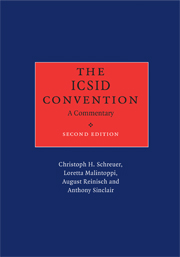Book contents
- Frontmatter
- Contents
- Foreword by Professor Sir Elihu Lauterpacht, CBE, QC
- Authors' preface to the second edition
- Table of cases
- List of abbreviations
- Text of the ICSID Convention
- Procedural calendar
- PREAMBLE
- CHAPTER I International Centre for Settlement of Investment Disputes
- Article 1 Establishment of Centre
- Article 2 Seat of Centre
- Article 3 Organization of Centre
- Article 4 Composition of Administrative Council
- Article 5 Chairman of Administrative Council
- Article 6 Functions of Administrative Council
- Article 7 Decisions of Administrative Council
- Article 8 No Remuneration for Members
- Article 9 Composition of Secretariat
- Article 10 Secretary-General and Deputy Secretary-General
- Article 11 Functions of Secretary-General
- Article 12 Panels of Conciliators and Arbitrators
- Article 13 Designation to Panels
- Article 14 Qualities of Panel Members
- Article 15 Periods of Office of Panel Members
- Article 16 Multiple Designations
- Article 17 Financing
- Article 18 Legal Personality of Centre
- Article 19 Immunities and Privileges of Centre
- Article 20 Immunity from Legal Process
- Article 21 Personal Immunities
- Article 22 Immunities of Parties and Witnesses
- Article 23 Archives and Communications
- Article 24 Tax Exemptions
- CHAPTER II Jurisdiction of the Centre
- CHAPTER III Conciliation
- CHAPTER IV Arbitration
- CHAPTER V Replacement and Disqualification of Conciliators and Arbitrators
- CHAPTER VI Cost of Proceedings
- CHAPTER VII Place of Proceedings
- CHAPTER VIII Disputes between Contracting States
- CHAPTER IX Amendment
- CHAPTER X Final Provisions
- Final Clause
- Consolidated bibliography
- Index by article
- Index by subject
Article 24 - Tax Exemptions
from CHAPTER I - International Centre for Settlement of Investment Disputes
Published online by Cambridge University Press: 07 September 2010
- Frontmatter
- Contents
- Foreword by Professor Sir Elihu Lauterpacht, CBE, QC
- Authors' preface to the second edition
- Table of cases
- List of abbreviations
- Text of the ICSID Convention
- Procedural calendar
- PREAMBLE
- CHAPTER I International Centre for Settlement of Investment Disputes
- Article 1 Establishment of Centre
- Article 2 Seat of Centre
- Article 3 Organization of Centre
- Article 4 Composition of Administrative Council
- Article 5 Chairman of Administrative Council
- Article 6 Functions of Administrative Council
- Article 7 Decisions of Administrative Council
- Article 8 No Remuneration for Members
- Article 9 Composition of Secretariat
- Article 10 Secretary-General and Deputy Secretary-General
- Article 11 Functions of Secretary-General
- Article 12 Panels of Conciliators and Arbitrators
- Article 13 Designation to Panels
- Article 14 Qualities of Panel Members
- Article 15 Periods of Office of Panel Members
- Article 16 Multiple Designations
- Article 17 Financing
- Article 18 Legal Personality of Centre
- Article 19 Immunities and Privileges of Centre
- Article 20 Immunity from Legal Process
- Article 21 Personal Immunities
- Article 22 Immunities of Parties and Witnesses
- Article 23 Archives and Communications
- Article 24 Tax Exemptions
- CHAPTER II Jurisdiction of the Centre
- CHAPTER III Conciliation
- CHAPTER IV Arbitration
- CHAPTER V Replacement and Disqualification of Conciliators and Arbitrators
- CHAPTER VI Cost of Proceedings
- CHAPTER VII Place of Proceedings
- CHAPTER VIII Disputes between Contracting States
- CHAPTER IX Amendment
- CHAPTER X Final Provisions
- Final Clause
- Consolidated bibliography
- Index by article
- Index by subject
Summary
Art. 24 deals with the freedom from taxation. Para. 1 covers the Centre itself. Para. 2 covers persons who are permanently associated with the Centre's work. These are the Chairman, the members of the Administrative Council and officials and employees of the Secretariat. Para. 3 covers conciliators, arbitrators and members of ad hoc committees. Parties, agents, counsel, advocates, witnesses and experts enjoy no exemption from taxation.
The Centre
The text of Art. 24(1) was contained in all drafts to the Convention and under-went almost no change (History, Vol. I, p. 104). It was copied from the parallel provisions of the World Bank's and International Monetary Fund's Articles of Agreement1 (History, Vol. II, pp. 389, 744/5). There was some debate about local taxes or rates which cover actual services (at pp. 390, 666/7, 744). The reference to “operations and transactions” was explained by the fact that the Centre might want to enter into various contracts (pp. 392, 744/5). The exemption from the collection of taxes was explained by the practice of countries to impose the liability for withholding and paying taxes on employers (at pp. 745/6).
- Type
- Chapter
- Information
- The ICSID ConventionA Commentary, pp. 69 - 70Publisher: Cambridge University PressPrint publication year: 2009



